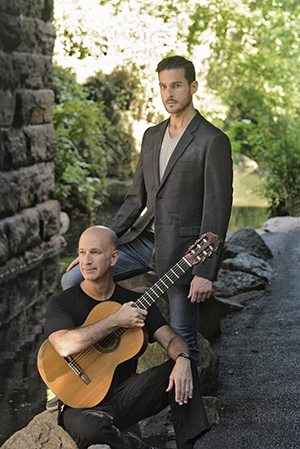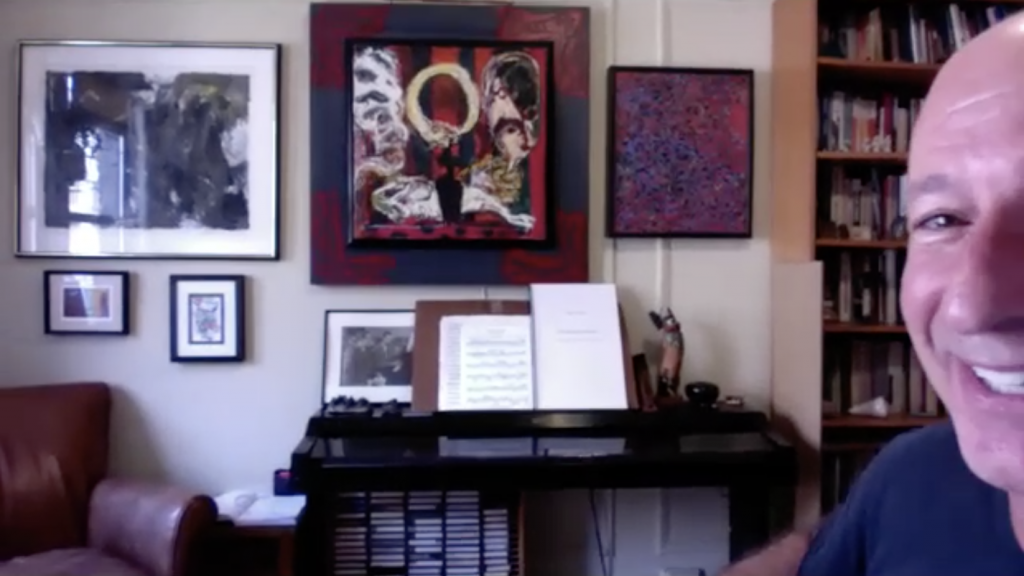by Jarrett Hoffman

On Sunday, September 20 at 4:00 pm, Akron’s Arts at Holy Trinity will present Die schöne Müllerin in a recently-recorded, virtual performance by baritone Michael Kelly and guitarist David Leisner. Adding another touch of interpretation, visual artist Kevork Mourad will offer prepared animation and imagery to accompany the music. Click here to register to attend.
During a recent Zoom call with Leisner, who made the arrangement, and who chairs the guitar department at the Manhattan School of Music, I asked about the inspiration behind moving this cycle into the world of the guitar.
The first part of that inspiration? Simple: Leisner’s love of the music. “I’ve been listening to this piece for — God, most of my life,” he said. “It’s one of my favorite pieces in the world, and I can never get enough of it.”
The second part came from the connection between Schubert and the guitar, an instrument that became increasingly popular during the composer’s lifetime. Scholars debate whether Schubert actually played the guitar, but you can count Leisner in the camp of those who believe he did.
“I’m not a musicologist, so I have not done extensive research,” he said. “But I am a highly intuitive, artistic person, and what I see and hear in the music tells me that with a song like Nacht und Träume and even some of the songs in Die schöne Müllerin, there’s just no question.” To Leisner, it’s not whether Schubert played the guitar, but the extent of his playing. “And the musicologists can argue about it from now until doomsday,” he said, laughing.
Another reason Leisner finds Die schöne Müllerin to fit the guitar is the nature of the pieces. “They’re very much like folk songs, but incredibly high-level, art-music folk songs,” he said — adding that folk songs are the natural terrain of the guitar.
That doesn’t mean that every song was easy to arrange. “Some of them fit really naturally. Others took a lot of work on my part to kind of corral them and wrestle them into being guitar pieces.”
Arranging, he said, is “the art of subtraction.” In certain places, taking out “a note here and a note there” made the music much more playable. And in a few cases, “though remarkably not many,” he had to re-voice a chord. “I tried to stay as close as possible to the original while maintaining an ease of playing that one would have, more or less, on the piano — and yet still make it sound like it was written for the guitar.” The arrangement has been published by Theodore Presser.
Leisner and Michael Kelly have been touring the piece for several years now. This will be their sixth time playing it in public, “and I suspect it won’t be the last,” the guitarist said, adding that he’s only ever performed it with Kelly.
“I won’t rule out playing it with other people, but at the same time I’d feel a little weird being unfaithful, as it were, to Michael,” he said, laughing. “He’s amazing. He really has delved into Schubert all of his singing life — he has a special affection for this piece, and he loves doing it with guitar. It’s very exciting for us to play this again, and we’re only sorry we can’t do it in front of your audience. Hopefully another time.”
Leisner and Kelly planned to pre-record the concert late last week in a venue in New York City called The Cell, “known for alternative, interesting projects,” the guitarist said. “It’s a nice little concert space with a proper stage, very good equipment, and people to run it. So I think we’ll have a first-class recording of what will be a live concert — we’ll do it in one take.”
Of course, getting two people together in a room to play music is not an easy thing to do during the coronavirus pandemic, especially when a singer is involved. Trust will be an important factor for the duo. “Michael has been very vigilant and cautious about COVID precautions, and so have I,” Leisner said.
At their first rehearsal in the guitarist’s apartment, they stayed “a good nine feet apart,” with a fan aimed at Kelly and out the window. Leisner wore a mask, though at the time of our conversation, he hadn’t yet decided whether he’d wear one during the recording.
“It’s more than a little odd visually,” he said, especially given the “nakedness” of guitar and voice as a combination — guitar being much quieter than piano, and Leisner and Kelly being stationed side by side. “There’s a very powerful, intimate connection there, and whether or not I’ll feel that a mask is appropriate, I’m not sure.”
We closed our conversation on another topic: visual art. The recent addition of Kevork Mourad’s pen and ink to this project is not surprising for anyone who has gotten a peek of Leisner’s apartment, whether in person or through the camera lens of a computer.
“I actually have quite an art collection,” he said. “I’m a real collector — a nut,” he said, laughing. “Completely obsessed.”
One of the works hanging on the wall behind Leisner was by Gloria Petyarre. “She’s one of the better-known Aboriginal painters — she’s wonderful,” he said. “I got that when I was touring in Australia. I think it’s called Lizard Dreaming.”
Another one he pointed out: Looking Back by Samuel Messer, associate dean of the Yale School of Art and “a great contemporary artist,” Leisner said. “I wish I could show it to you better, but it’s him as an older man on the left, looking through an ouroboros kind of figure — looking through eternity at a reflection of himself as a younger man on the right.”
Published on ClevelandClassical.com September 15, 2020.
Click here for a printable copy of this article




